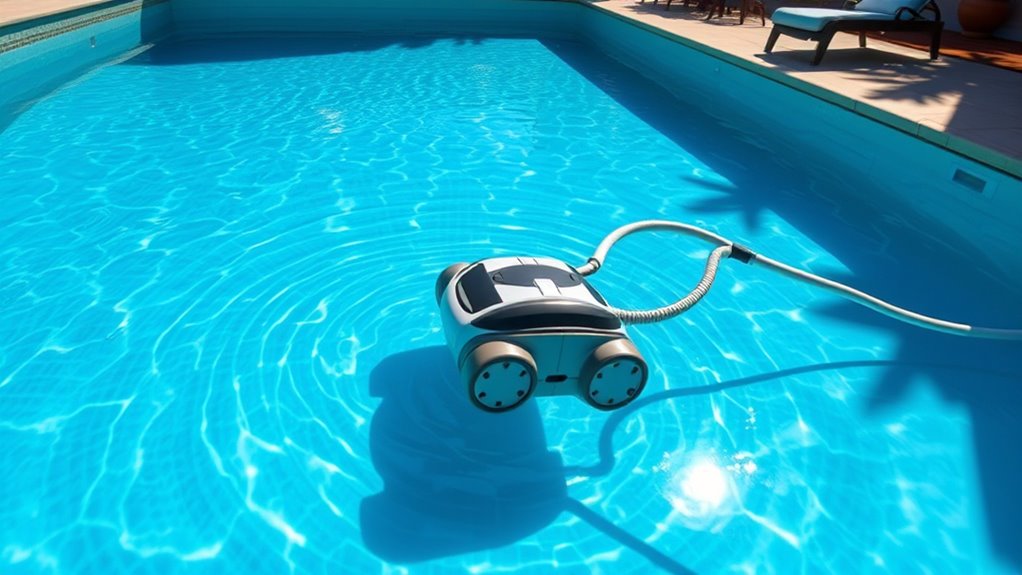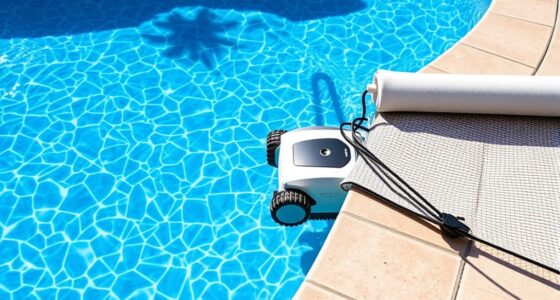Run your pressure pool cleaner once or twice a week for ideal results, but how often depends on your pool’s size, debris load, and seasonal changes. In high debris periods like fall, you might need more frequent cleaning, while in winter or periods of little use, less frequent runs are enough. Monitoring your pool’s clarity and debris buildup helps you adjust accordingly. To discover more helpful tips, keep exploring the best ways to keep your pool pristine.
Key Takeaways
- Run the pressure cleaner once or twice weekly for in-ground pools during peak usage seasons.
- Increase cleaning frequency during heavy debris periods like fall, spring, or after storms.
- Adjust cleaning schedule based on pool size, debris load, and local environmental factors.
- Monitor filter efficiency and water clarity to determine if more frequent cleaning is necessary.
- Reduce cleaning frequency in winter if the pool is not in regular use to prevent unnecessary wear.
Factors Influencing Cleaning Frequency

Several factors determine how often you should run your pressure pool cleaner. One key consideration is maintenance costs; running it too frequently can lead to higher expenses, while infrequent use might cause debris buildup. Equipment durability also plays a role; if your cleaner is built with sturdy parts, you can run it more often without risking damage. Conversely, if it’s older or less durable, overuse could shorten its lifespan. The size of your pool, the amount of debris, and your local environment influence cleaning frequency as well. Regular use helps prevent dirt from settling, but overdoing it can accelerate wear and tear or increase costs. Balancing these factors ensures your cleaner performs well without unnecessary expenses or damage.
Recommended Schedules for Different Pool Types
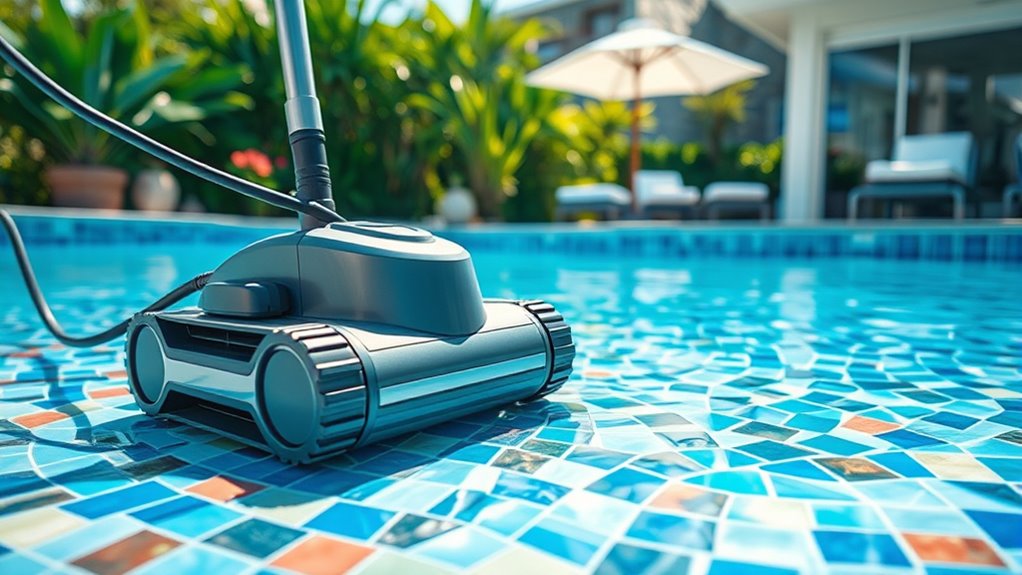
The ideal cleaning schedule for your pressure pool cleaner varies based on your pool type. For in-ground pools, running the cleaner once or twice a week typically maintains proper water quality, especially if you keep the pool chemically balanced. Regular cleaning helps preserve pool chemical balance and prevents algae buildup. Water circulation is vital for effective cleaning, as it ensures debris is moved toward the cleaner and filter system. Above-ground pools may need more frequent runs, especially during hot weather or heavy use, to keep debris under control. Remember, consistent equipment maintenance, such as checking filters and hoses, ensures excellent cleaner performance. For saltwater pools, a similar schedule applies, but monitor for salt buildup and adjust cleaning frequency as needed. Additionally, water chemistry balance plays a crucial role in maintaining pool clarity and equipment longevity. Tailoring your schedule to your pool type helps keep your water clear, reduces chemical use, and extends equipment lifespan.
Signs That Indicate Your Pool Needs More Frequent Cleaning
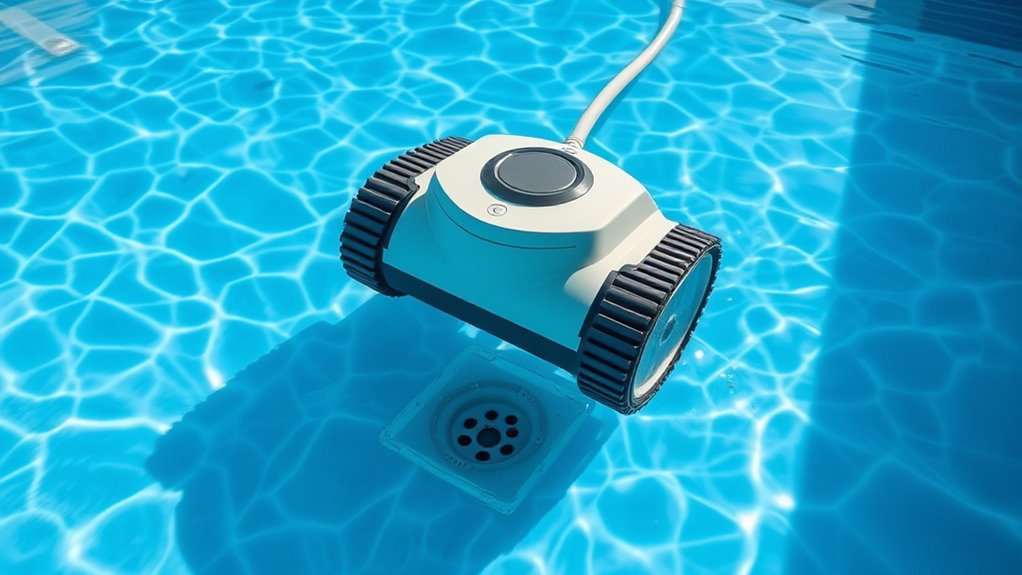
If you notice more debris floating in your pool or settling on the bottom than usual, it’s a clear sign you need to clean more often. Visible dirt or algae on the walls or surface also indicates that your current schedule isn’t enough. Staying alert to these signs helps keep your pool sparkling and healthy. Additionally, monitoring the debris accumulation rate can help determine if your cleaning frequency needs adjustment. Regularly checking the filter efficiency can also reveal if more frequent cleaning is necessary to maintain optimal performance. Incorporating advanced cleaning technology can further improve your pool maintenance routine.
Unusual Debris Accumulation
When you notice an unusual buildup of debris in your pool, it’s a clear sign that your pressure cleaner might need to work more often. This accumulation could indicate issues like algae buildup or poor chemical balancing. If debris appears faster than usual, consider these signs:
- Excess leaves, twigs, or dirt collecting rapidly.
- Persistent algae patches despite regular cleaning.
- Debris settling unevenly, hinting at circulation problems.
- Increased cloudiness or murkiness, signaling chemical imbalance.
- Regularly checking pool maintenance routines can help identify underlying causes early. Additionally, chemical levels play a crucial role in preventing debris buildup by supporting proper water balance and circulation. Keeping an eye on water quality is essential because poor water quality can accelerate debris accumulation and hinder cleaning efficiency. Regularly inspecting pool equipment can also ensure that filters and pumps are functioning correctly, which is vital for effective cleaning. These signs mean your pool isn’t being cleaned effectively, and your pressure cleaner might need to run more frequently. Addressing algae buildup and maintaining proper chemical levels will help reduce debris accumulation and keep your pool cleaner longer.
Visible Dirt or Algae
Noticing visible dirt or algae on your pool’s surface is a clear sign that your cleaning schedule might need adjustment. When you see debris, algae, or cloudiness, it indicates your pool chemistry may be off or equipment maintenance is lacking. Regular cleaning helps maintain clear water and prevents algae buildup. Consider increasing your pressure pool cleaner’s frequency if these signs persist. Here’s a quick guide:
| Issue | Cause | Solution |
|---|---|---|
| Visible dirt or algae | Imbalanced pool chemistry | Increase cleaning frequency |
| Cloudy water | Poor filtration | Check equipment maintenance |
| Algae growth | Lack of chlorine | Adjust chemical levels |
| Debris accumulation | Infrequent cleaning | Clean more often |
Keeping up with these signs ensures your pool stays clean and chemically balanced. Proper maintenance and understanding of pool chemistry are essential for effective cleaning. Regularly monitoring your filtration system can also help prevent these issues from arising in the first place. Additionally, a proper chemical balance plays a critical role in algae prevention and overall water clarity. For optimal results, maintaining a consistent cleaning schedule is recommended to keep your pool in top condition year-round. Additionally, understanding the importance of equipment upgrades such as filters and pumps can improve overall pool maintenance effectiveness.
Benefits of Regular Pressure Pool Cleaning
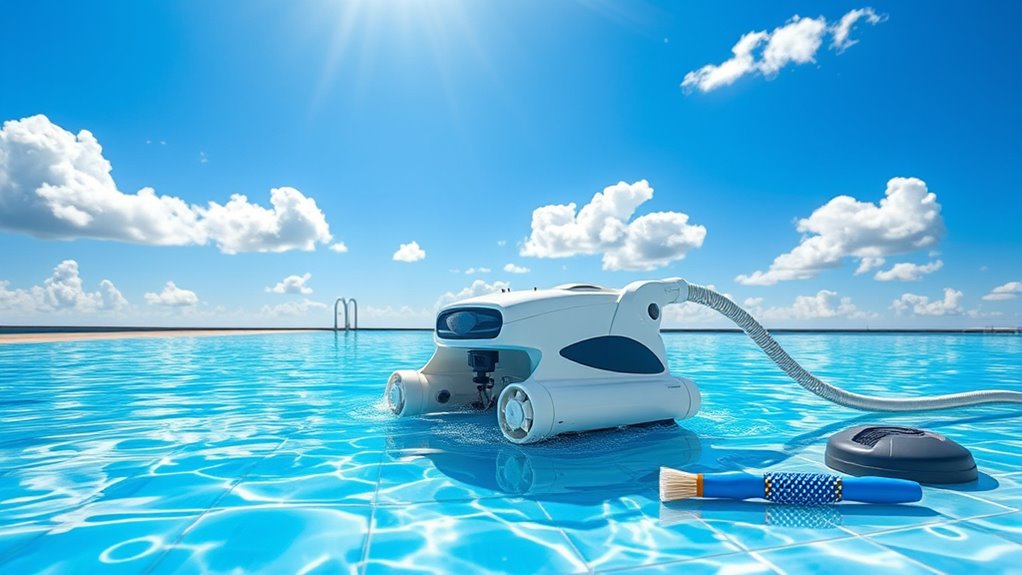
Regular pressure pool cleaning offers numerous benefits that keep your pool in top condition. It simplifies pool maintenance by preventing debris buildup and reducing the need for chemical adjustments. Consistent cleaning helps maintain proper water chemistry, making your pool safer and more inviting. By regularly removing dirt and algae, you’ll extend the lifespan of your equipment and reduce costly repairs. Additionally, incorporating quality pool tuning can optimize your system’s performance for more efficient operation. Proper engine performance in your pool system ensures that circulation and filtration work optimally, reducing energy costs and improving overall effectiveness. Maintaining system efficiency through regular cleaning can also help prevent the buildup of mineral deposits that may damage equipment over time. The use of artistic techniques in maintaining pool aesthetics demonstrates how innovative practices can enhance the visual appeal of your pool environment. Staying proactive with preventative maintenance can help identify potential issues early, saving you money and preventing major repairs. Consider these advantages:
- Improved water clarity and safety
- Easier pool maintenance routines
- Balanced water chemistry for healthier swimming
- Longer equipment lifespan and fewer repairs
Staying on top of cleaning ensures your pool stays sparkling, saving you time and money while providing a more enjoyable swimming experience.
Adjusting Your Routine for Seasonal Changes
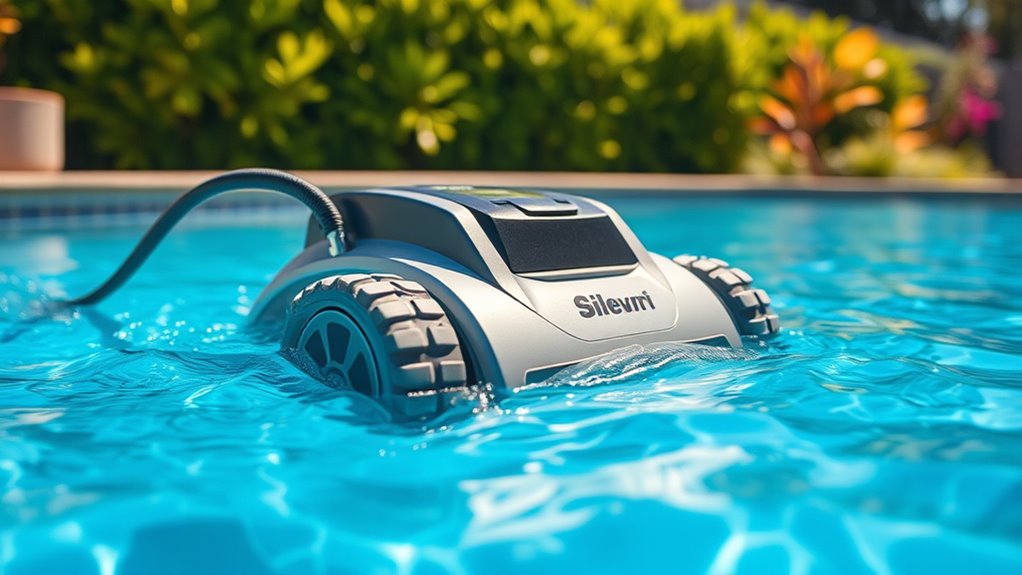
Adjusting your pressure pool cleaning routine for seasonal changes is essential to keep your pool in ideal condition year-round. As seasons shift, debris levels and water chemistry fluctuate, affecting your pool maintenance needs. During spring and fall, you may need to increase your cleaning schedule to handle leaves, pollen, and dirt. In winter, reduce cleaning frequency if the pool is not in use, but guarantee circulation and chemical balance are maintained. Recognize that seasonal changes impact the amount of debris and algae growth, so adapting your routine prevents buildup and keeps your water clear. Regularly review your cleaning schedule to match seasonal demands, ensuring your pressure pool cleaner operates efficiently and your pool remains inviting and well-maintained throughout the year. Additionally, monitoring celebrity lifestyle insights can inspire innovative ways to enhance your pool area with stylish decor and private paradises. Being aware of relationship patterns and their influence on your routines can also help you stay consistent with maintenance, especially during unpredictable weather changes. For optimal results, consider adjusting your cleaning frequency based on the specific environmental factors of each season to extend the life of your pool equipment. Incorporating digital literacy programs can help you stay informed about new cleaning technologies and maintenance techniques, making seasonal adjustments easier. Keeping an eye on filter replacement guidelines can also help prevent equipment issues and maintain water clarity as debris levels fluctuate.
Tips for Maximizing the Efficiency of Your Cleaner
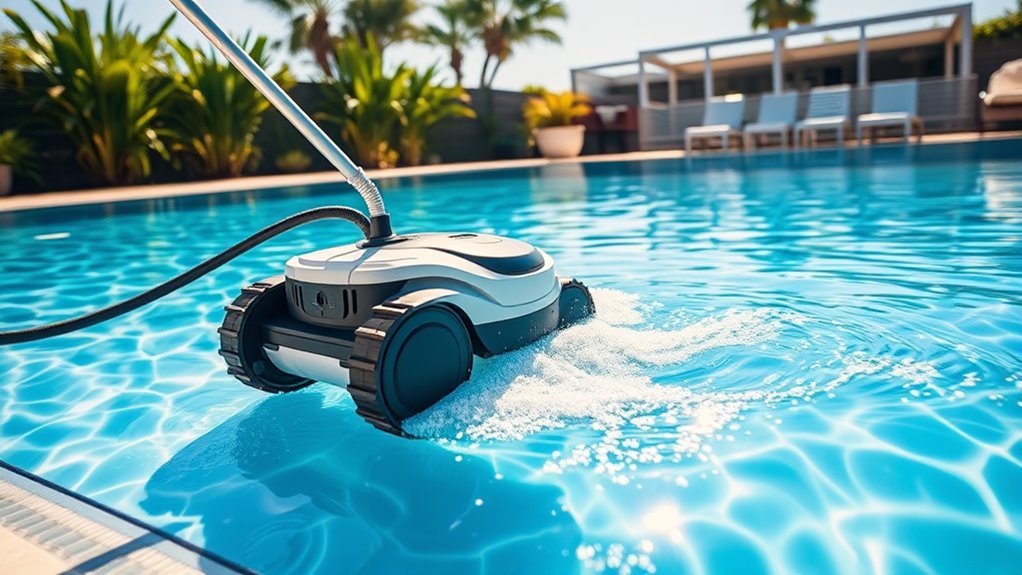
To get the most out of your pressure pool cleaner, you should focus on improving its settings and maintenance routines. Proper equipment maintenance ensures consistent performance, while maintaining a balanced pool chemical level prevents debris buildup. Here are four tips to maximize efficiency: 1. Regularly check and adjust the pressure to match the pool’s size and debris load. 2. Keep your pool’s chemical balance in check to reduce algae and dirt. 3. Clean or replace the cleaner’s filter and hoses frequently. 4. Inspect and tighten fittings to prevent leaks and guarantee ideal water flow. Additionally, understanding astrological signs may influence perceptions of beauty, which can be a fun way to boost confidence while maintaining your pool area.
Frequently Asked Questions
Can a Pressure Pool Cleaner Work on All Pool Surfaces?
A pressure pool cleaner can work on many pool surfaces, but its efficiency depends on pool surface compatibility. While it’s great for concrete, vinyl, and fiberglass pools, some models may have limitations with delicate surfaces like tile or pebble finishes. Always check your cleaner’s specifications to avoid damage. Understanding pressure cleaner limitations and pool surface compatibility helps you choose the right cleaner and maintain your pool’s cleanliness effectively.
How Long Should a Typical Pressure Pool Cleaning Session Last?
Imagine your pool as a mirror of tranquility, reflecting your care. A typical pressure pool cleaning session should last about 1 to 2 hours, depending on debris buildup. You’ll want to run the cleaner enough to clear surface pool debris and maintain your cleaning schedule. Regular sessions keep your pool pristine, preventing debris from settling and ensuring sparkling clarity with each swim.
Is It Necessary to Manually Clean Filters Alongside the Pressure Cleaner?
You should still perform manual cleaning of your filters even when using a pressure pool cleaner. Filter maintenance is vital because pressure cleaners can leave debris behind or clog filters over time. Regular manual cleaning ensures peak filtration and prevents equipment strain. Check your filters weekly, and clean them as needed to keep your pool sparkling and your pressure cleaner working efficiently. Don’t rely solely on the pressure cleaner for a spotless pool.
How Does Pool Size Affect Cleaning Frequency?
They say “a stitch in time saves nine,” and that’s true for maintaining your pool. Larger pools with greater capacity require more frequent cleaning to prevent debris buildup. You should adjust your cleaning schedule based on your pool size, running your pressure pool cleaner more often for bigger pools. This way, you keep your water clear, and your equipment runs smoothly, saving you time and effort in the long run.
Can Weather Conditions Impact the Pressure Cleaner’S Effectiveness?
Weather impact and climate considerations definitely affect your pressure pool cleaner’s effectiveness. If it’s windy or rainy, debris can pile up quickly, making your cleaner work harder or less efficiently. Extreme heat or cold can also impact its operation. To keep your pool spotless, you should monitor weather conditions regularly and adjust your cleaning schedule accordingly, ensuring your pressure cleaner performs at its best regardless of the climate.
Conclusion
Regular pressure pool cleaning is essential for maintaining crystal-clear water and preventing costly repairs. Did you know that pools cleaned weekly can reduce algae growth by up to 80%? By sticking to a consistent schedule, watching for signs of buildup, and adjusting for seasonal changes, you’ll keep your pool in top shape. Remember, a cleaner pool isn’t just more inviting—it’s safer and more enjoyable for everyone. Stay proactive, and enjoy your sparkling oasis all season long.
